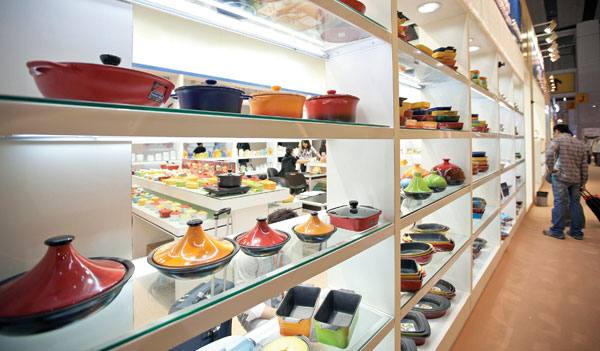Five ceramics firms set to fight against EU dumping probe
Updated: 2012-05-03 08:06
By Qiu Quanlin in Guangzhou (China Daily)
|
|||||||||||
|
Ceramic kitchenware on display at the 108th Canton Fair in Guangzhou, Guangdong province. Forbes Conrad / Bloomberg |
Five Chinese makers of household ceramics have been chosen to represent the industry in the latest anti-dumping investigation undertaken by the European Commission, the executive body of the European Union, industry insiders said.
They also plan to take legal action in the case, the sources said.
The companies have begun to submit reports about themselves to the European Commission, said Ding Xuewen, international trade manager of the ceramics maker Hunan Hualian China Industry Co.
"We have invited international lawyers from Belgium to help us in the time leading up to the anti-dumping investigation," Ding, also vice-chairman of the company, said at the China Import and Export Fair, often called the Canton Fair.
The second phase of the largest trade fair held in China ended on Friday in Guangzhou, Guangdong province.
"We will do our utmost to defend the rights of Chinese exporters in the European market, despite the high legal costs," Ding said. "Otherwise, the whole industry will suffer big losses."
She said hiring international lawyers for the case will cost the company about 2 million yuan ($317,500).
Hualian, based in Liling city, Hunan province, is one of the companies that were chosen on April 2 in sample inquiries by the European Commission to be representatives of the ceramics industry.
The other four are the Sanhuan Enterprises Group and Beiliu City Laotian Ceramic Co, both in the Guangxi Zhuang autonomous region; the Zhuhai-based CHL International; and the Shandong-based Niceton Group.
Hualian exports nearly 70 percent of its products to the US and Europe. It sent about $12 million worth of ceramics to Europe alone last year.
"In the current situation, it is hard to evaluate how great the profit losses will be from the European market," Ding said. "But we saw fewer buyers from Europe at the trade fair this time."
More than 2,000 Chinese makers of household ceramics could be affected by the latest anti-dumping investigation. The action follows various similar inquiries, which targeted Chinese producers of building ceramics last year and makers of ceramic tiles in 2010, sources with the China Ceramics Industrial Association said.
The European Commission is expected to announce a preliminary ruling in the ceramics case by Nov 16 and a final ruling by May 16, 2013, the CCIA said.
Since the European Commission started the investigation on Feb 16, about 400 exporters of Chinese household ceramics have submitted paperwork to join in the legal response.
The EU investigation is the largest of its kind to emerge since Indonesia began a similar inquiry into Chinese ceramic tableware and kitchenware products early this year. The Indonesia anti-dumping committee has made a final ruling in that case and plans to impose a punitive tax rate of up to 87 percent on imported Chinese household ceramics.
Following the Indonesian investigation, the export value of ceramics in Guangdong, one of the chief manufacturing and export bases of ceramics, dropped by 5.9 percent to $490 million in January, customs sources said.
It was the first time the province's ceramics exports decreased since December 2009.
"The anti-dumping investigation is aimed at restricting exports from Chinese ceramics makers," Ding said. "But we should take this as an important opportunity to improve our products.
"After years of development, Chinese ceramic products have been brought up to the high standards demanded by the European market. They are not different from what's made in Europe."
The European Union plans to look at Russian exports of ceramics to determine what comparable products from China should cost.
"It's absolutely unfair to link Russian and Chinese ceramic products, given that the cost of Russian products is much higher than that of Chinese products and Russia is the source of a small proportion of the ceramics that are in the European market," Ding said.
Contact the writer at qiuquanlin@chinadaily.com.cn
Today's Top News
President Xi confident in recovery from quake
H7N9 update: 104 cases, 21 deaths
Telecom workers restore links
Coal mine blast kills 18 in Jilin
Intl scholarship puts China on the map
More bird flu patients discharged
Gold loses sheen, but still a safe bet
US 'turns blind eye to human rights'
Hot Topics
Lunar probe , China growth forecasts, Emission rules get tougher, China seen through 'colored lens', International board,
Editor's Picks

|

|

|

|

|

|






